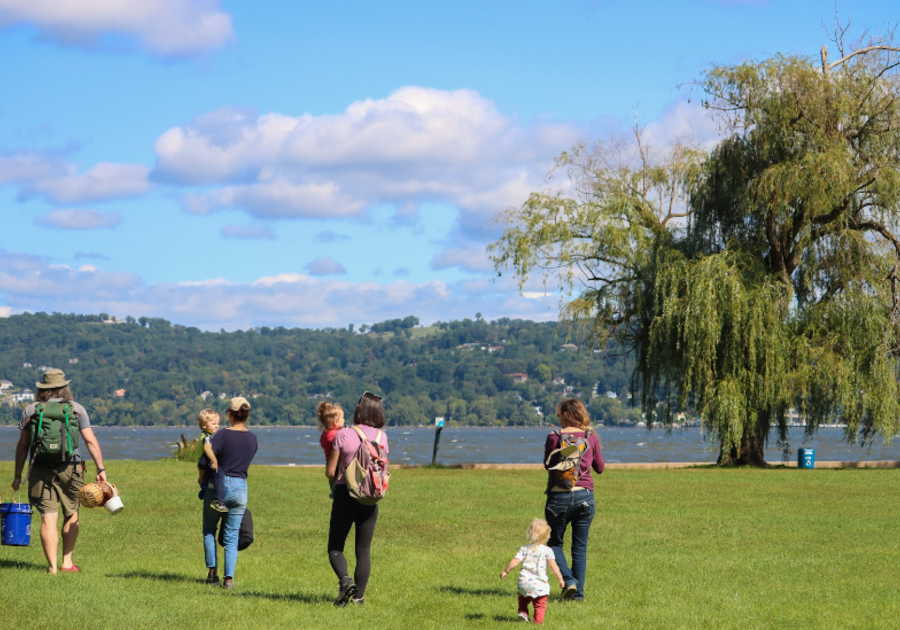It’s well documented that outdoor play and exploration is imperative to childhood education, but a lot of parents don’t exactly know how to best do that. Of course, bringing the toys outside and running around the yard are important associations, but there’s so much more fun to be had, things to be learned. And another thought to consider as well.. Why should the kids have all the fun?
At the Rewilding School, we aim to deliver educational opportunities through the lens of play and imagination. Our educators are trained naturalists, bushcrafters, and teachers; they bring their unique skill sets to every day of class. Our Wildlings and Wild Ones programs aim to deliver those opportunities to you as well as your children, better equipping you to partake and lead in the activities that will best prepare them for the rest of their lives.
Sitting in on the Wild Ones (10mo-2yr) and Wildlings (2-4yr) programs is always a treat for me. I watch a group of kids arrive, often clinging to the legs of the caregiver or parent that brought them there. As we ease into the day, giving them small activities and distractions, they slowly warm up to each other, and the learning starts. The activities ebb and flow from high energy to low energy. At their peaks, the kids are engaged in a nature walk, or a tactile activity like interacting with simple tools and the natural elements. These moments give the parents a chance to talk to each other, bonding over the Hudson Valley, work, and parenting. Snack and Story provide great breaks, where the kids sit with their parents and reconnect, physically and emotionally, and reset their bodies and minds. Throughout the session, one of our educators is providing morsels of information for both the kids and the parents about the natural world of Westchester. But there’s a more exciting aspect to learning outdoors that we can’t write into the lesson plan. And that’s the random beauty of nature.
Whether it’s a red-tailed hawk swooping in the trees overhead, a family of geese exploring the riverbanks, or a freshly tapped maple tree bubbling over with morning sap, our families get the rare chance to experience what life in the woods is really like–and learn more about what they’re seeing through a trained eye. I watch as groups of parents and their children learn and play together, learning and interacting with other parents and kids to create a sort of community.
A few months ago, I was photographing a Wild Ones class, and it was a pretty small group, two or three families. Our educator, Ryan, who can start a fire from pretty much anything and would be the ideal person to travel with at the end of the world, decided to frame the opening section of the class with a puddle. He had a myriad of metal pans with different surfaces, some had colander holes at the bottom, some were flat, still others had a lip at one end, and the kids were just enamored with them. Filling the pans with water and pouring them out, letting the water sieve from one to ther other - just experiencing the joys of water fall.
Ryan noticed some black walnuts and pinecones, and we added in concepts of floating and sinking, objects interacting with the water; concepts of weight and the results of your own actions. And the whole time, the parents were standing by, engaging int he play when they felt the urge, and talking with each other. One of the parents talked about their time working with the Waste Department in New York City, another had just moved to the area and wanted recommendations for good sushi. It was bonding time for them, too, not just their kids. Ryan described the uses of black walnuts as a dye, how we use it in the summers, and how it can stain your fingers for weeks.
When those families left, the parents and children were engaged, present, and happy. They were excited at the prospect of coming back next week for another session. Not only was their money well spent, their day was only just starting and already they had connected with new people, learned a lot, and spent valuable time outdoors. Programs like we have are great resources, but they can be hard to commit to. A whole season of Thursday mornings or Saturday afternoons isn't attainable for most families, and we understand that. That's why, for our Wild Ones, Wildlings, and Archery families, we are trying something new - A Flex Pass. It's five individual classes that you can use all throughout the season, that roll over into the next season as well. This means that as long as there's a space open in a class, you can register to drop by as you have time, allowing for greater, well, flex in your schedule. We also have a two-week trial coming up for our preschool programs in March, so please visit this link for more information and to sign up for one or multiple days.
In the pursuit of quality parenting, we often struggle to find time to “do it all”. Socialization, exercise, bettering ourselves through education–they aren’t easy to maintain when there’s young ones to teach.. So many outlets that engage our children leave us wanting more, and the drone of Cocomelon for the fifth time this week can turn quickly into background static. And we see that! We create family-focused programming that can engage families at every level, and that makes the bonding so much more real. It’s no longer an activity for your kids, it’s one for your family.
So, I’ll ask again–why do the kids get to have all the fun?
If you’re interested in the Rewilding School, we recommend checking out our website, and our Facebook, Instagram, and Tik Tok for great videos taken by yours truly that showcase our classes as well as our educators prowess. If you want to sign up for our programs, the registration link is here.
If this article has left you with any questions, email us at info@rewildingschool.com.
If you liked this article, consider reading more of ours on our Substack, the Forest Leaflet.
Happy Living!



